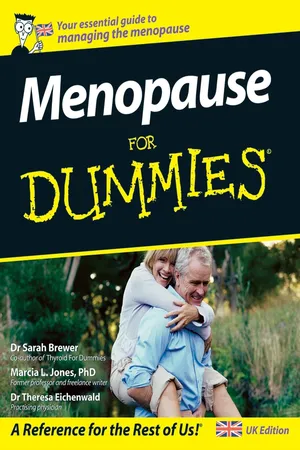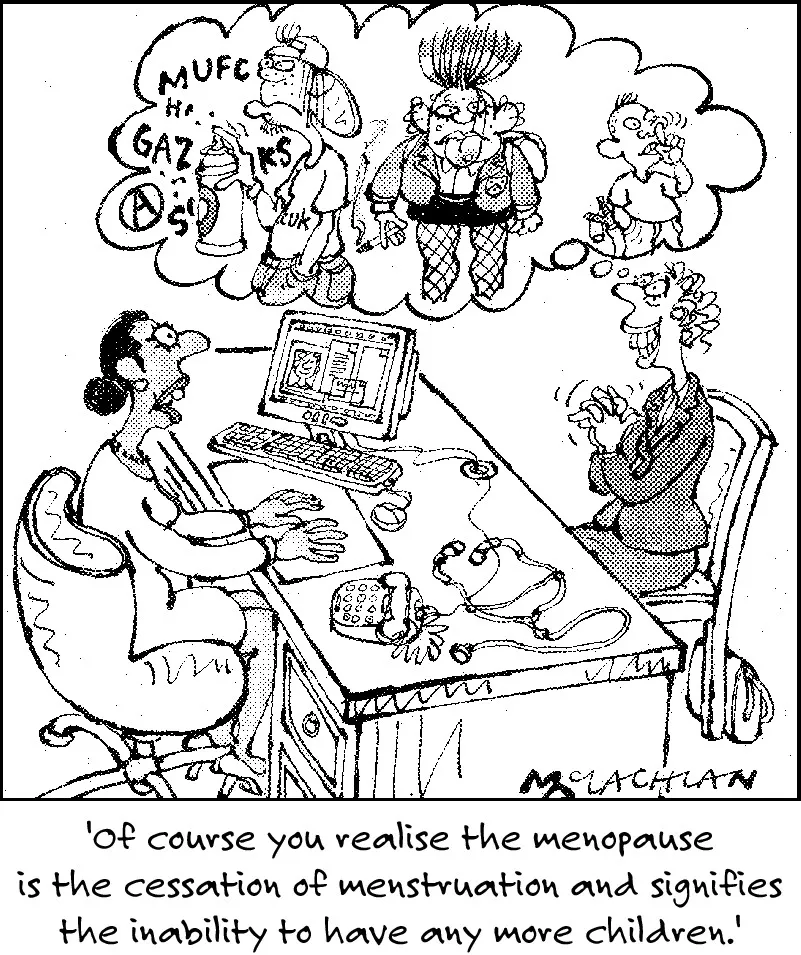In this part . . .
In Part I, we provide you with an outline to your menopausal years. We define menopause, review the biology, introduce you to the actors – your hormones – and briefly review the related symptoms and health conditions (physical, mental, and emotional). Get to it before the usher dims the lights.
Chapter 1
Reversing Puberty
In This Chapter
Getting your feet wet with the basics on menopause
Figuring out where you are on the menopausal road map
Understanding the symptoms of menopause
Outlining the healthcare options for a long and healthy life
‘Y ou’ve come a long way, baby’ is a recurring slogan for baby boomers. The phrase certainly says a lot about women in this generation as they approach that rite of passage known as menopause. As an individual, you no doubt feel you’ve come a long way too, as your menopause approaches. Society, in general, and women, in particular, have also come a long way in opening up full and frank discussions about the mysteries of menopause.
Puberty and menopause bracket the reproductive phase of your life. They have a lot in common: They’re both transitions (meaning that they don’t last forever), they’re both triggered by hormones, and they both cause physical and emotional changes that can make you feel like you’re going a little crazy.
The beginning of your reproductive years. Remember the journey? Your hormone levels shifted wildly and caused your first menstrual period. And don’t forget the erratic emotions that are the hallmark of teenage angst. But over the course of a few years, your hormones found a comfortable level and righted themselves again. Your unpredictable periods finally settled into a predictable pattern, and your emotional balance was more or less restored.
At the end of your reproductive years, your hormone levels go through a similar journey, this time causing the mid-life crisis, but your hormones eventually find a new, lower level of production. Your periods are erratic for a while, but they eventually wind down and stop. And just in case you’re wondering, those mid-life emotional crises eventually pass, too.
Keep in mind that the phrase ‘You’ve come a long way, baby’ closes with ‘but you’ve still got a long way to go’. Women today often live 40 or 50 years after the menopause. Most of us want to enjoy these years by visiting friends, taking care of our loved ones and ourselves, and continuing to participate in activities that give us pleasure.
In this chapter, we introduce you to the menopause so that you know what to expect when the time comes, or explain what is happening if the transition is already here.
Defining Menopause
Do you ever notice how you don’t really pay close attention to where you’re going when you’re the passenger in a car? You only start to worry about exit junctions and traffic lights when you’re the one behind the wheel. Well, menopause is just like that. We all hear about menopause and menopausal symptoms, but we rarely pay attention to the particulars until our turn arrives.
When you do slide into the driver’s seat and start paying attention, you may become frustrated by the confusing terminology associated with the whole menopause thing. Aside from the pamphlets you get from your doctor’s surgery, most books, magazines, and articles treat menopause like a stage that starts with hot flushes and goes on for the rest of your life. But, menopause actually means the end of menstruation. During the years leading up to menopause (called perimenopause), your periods are often so erratic that you’re never sure whether this period is the last one, but you aren’t officially menopausal until you haven’t had a period for a year.
A lot happens before you have your last period, and all this physical and mental commotion is associated with menopause. You may experience hot flushes, mental lapses, mood swings, and heart palpitations while you’re still having periods. But, when you ask your doctor whether you’re menopausal, he or she may check you over and say no. Relax: Your doctor isn’t wrong, and you aren’t crazy. You’re not menopausal. You’re perimenopausal.
Medical folks divide menopause into phases that coincide with physiological changes. We describe these phases later in this chapter, but you need to know something about the terminology that surrounds menopause. On the one hand, you have the medical terms associated with menopause, and on the other, you have the terms that you hear when you’re chatting with your friends.
The term perimenopause refers to the time leading up to the cessation of menstruation, when oestrogen production slows down. A lot of the symptoms that folks usually label as menopausal (hot flushes, mood swings, sleeplessness, and so on) actually take place during the perimenopausal years. This book is a stickler about using the term perimenopause rather than menopause to describe this early phase because you’re still having periods. We also use perimenopause to underline the physiological and emotional changes you experience before the end of your periods, which helps to distinguish these changes from those that happen after your body starts adjusting to lower levels of oestrogen.
Technically, the time after your last period is called postmenopause, but this word has never really caught on. So, in keeping with common usage, we most often use the term menopause to refer to the actual event and the years after menopause and use the more clumsy term postmenopause only when it helps to clarify things. When we talk in this book about menopausal women, we mean women whose periods have stopped – whether they’re 55, 75, or 105 years old.
The years leading up to and following menopause mark a pretty major transformation in your life. As you make your way through this phase, you probably want to know where you’re at within the whole grand scope of the change and what’s going on inside you. Here’s a brief description of the phases associated with menopause. (Don’t worry: Other chapters give you a lot more detail about the various stages.)
Making changes while approaching the change: Perimenopause
Perimenopause is the stage ...











